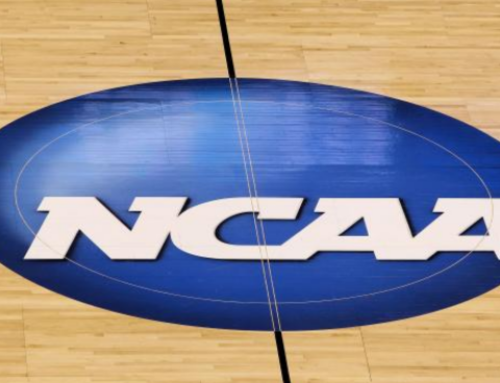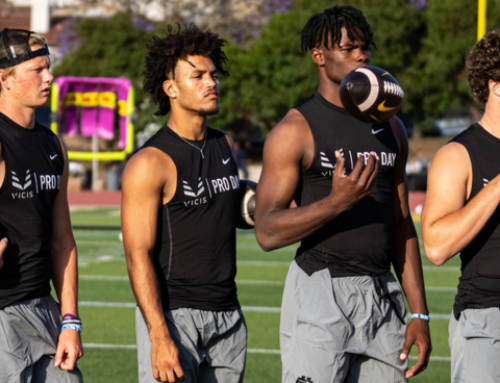A High School Athlete’s Guide to Using Social Media Effectively
The social media industry is booming.
Users are at an all-time high, revenue is at an all-time high and the trends are going up at a rapid pace into the foreseeable future. Whether you like it or not, social media is here to stay.
Over the years, I’ve seen social media evolve and grow. I’ve always taken interest in new discoveries in technology and related industries because, for a period of my life, I thought I wanted to pursue a career in that industry. While strength and conditioning turned out to be my true passion, I still love to apply some of the technological advances of society to my craft.
Athletes, no matter what their age, can do the same. Whether you’re a pro trying to create a brand or a high school student-athlete looking to enhance your recruiting profile, social media can be a powerful tool. But the catch is that it must be used smartly and strategically. Whether you know it or not, people are always watching—and you’re judged by who you are and how you behave when you think nobody is paying attention.
Depending on how a high school athlete uses it, social media can be both extremely beneficial or disastrously detrimental. Below is a guide designed to help athletes (and their parents) optimize social media usage. Use this guide as a tool to make yourself shine online the same way you shine on the court, field, track, etc.
The Power Platforms

There are hundreds of social media options out there—some you may have never heard of and some you probably can’t live without. For the purpose of this guide, we’ll stick with the biggest platforms in the industry.
A lot of the do’s and don’ts in this guide will revolve around the following social media platforms:
- Snapchat
- tiktok
These are the “Power 6” of social media sites and apps used by modern high school student-athletes. This is definitely not an exhaustive list, but it covers the seven apps that are likely installed on most kids’ phone, tablet or computer.
Below we’ll look at some overarching best practices that can allow athletes to use these apps (and others) most effectively.
Do This, Not That

When it comes to best practices online, remember that you want to SHINE. Use this simple acronym to help you shape up your online presence.
- Support: Use social media to support yourself and others. Show support for others’ content as well. Congratulate teammates on great games or practices. Use social media to spread positivity.
- Highlight: Use social media to highlight your individual and team accomplishments, along with anything else that you’d like to “brag” a bit about. Ace a test? Land an awesome internship? Let people know about it on social media.
- Inspire: Use social media to inspire others who pay attention to your account. Authentically empowering others is one of the most impactful things you can do for yourself. Share quotes or clips you might find inspiring and uplifting.
- Network: Use social media for networking and connecting with others by using positive interactions with other likeminded individuals.
- Educate: Use social media to educate your audience on the important factors of your life and career. What’s important to you and what’s helping you be successful on and off the field?
These tips will help you SHINE online the same way you shine in competition.
On the other hand, there are some definite social media no-no’s that will not only stop your shine, but likely cause you to ride the PINE.
- Plagiarize: Do not post content that does not belong to you without taking the proper steps to get permission. Sharing, retweeting and reposting is fine if you give credit where credit is due. Also, never pretend to be someone you are not online.
- Illegal Activities: If it’s illegal, don’t do it. And especially don’t post about it. But… don’t do it in the first place. This may sound simple, but a number of athletes have blown potential scholarships by posting about illicit activities on their social media.
- Negligence: Do not exhibit negligent behavior. This means think before you post. Put thought into the picture you’re painting of yourself online. It may be seen by people who’ve never met you and who have nothing more to go off of than your social media. If two kids are in a dead heat for a scholarship offer, that could be a deciding factor.
- Extreme Emotions: There’s nothing wrong with being authentic online, but you should be careful not to let emotions like anger, jealousy or frustration boil over on social media. What may seem like a fine post at the time could look terrible in hindsight after you’ve had the chance to cool off. Be authentic, but think before you post and keep some aspects of your personal life personal.
In addition to the SHINE and PINE methods for social media usage, here are some other general things to keep in mind before you post.
1) Nothing is truly private. Ever. Even if you’re account is locked, people can take screenshots and share them. Those live on long after a post is deleted.
2) Make yourself easily identifiable by including your name, sports, positions and class year in your bio. This will help coaches and other athletes find you and connect with you.
3) What you share, like or retweet is now your content. You’re associating yourself with that messaging.
4) Be authentic. Don’t constantly compare yourself to others and worry how you measure up. Be yourself.
5) Do not post (or share) anything you wouldn’t want to tell your grandmother.
6) Grammar still matters.
7) Never share your log-in info.
8) Use online tools to enhance what goes on in your day to day real life.
9) Don’t use social media during class.
Getting Noticed on Social Media

Finally, what you’ve been waiting for—how to get yourself noticed on social media. I’ll tell you this right now, randomly spamming hundreds of coaches with your Hudl highlight tape isn’t a big bang-for-your-buck way to go about things.
I recently had the chance to ask some collegiate coaches, who will remain anonymous, about this very topic at a national conference that I attended. Here are some of their answers on how social media can help get a young athlete noticed.
“Coaches get paid a healthy income to come watch kids play their sport. They know how fast you are, how well you read defenses, how many times you can bench 225. If you’re on social media carrying yourself in a way that would not represent our program in a positive way, we can go find someone who will.” – College Football Strength and Conditioning Coach
“Make sure your social media bio has relevant info that you’d like folks who visit the page to know about you. Don’t go crazy with all the hashtags, maybe put your GPA and SAT scores in there instead.” – College Basketball Assistant Coach
“Interact with us before you bombard us with emails and highlight tapes. Make a genuine connection with the staff so we can really get to know you, and you can also get to know us.” – Professional Baseball Scout
Just going off those three conversations, we can see a trend that really should not come as a huge surprise. The best way to use social media to network and promote yourself is by beginning conversations with genuine interaction.
Coaches don’t mind seeing your hard work on the court, field, track, etc., but think about it, are you more willing to help out a stranger or someone you consider an acquaintance? Having a rapport with someone before you ask them to help is always going to increase your chances of success.
Also, please don’t put all of your eggs in the social media basket. Coaches leave no stone unturned to find the most talented and hard-working kids from all over. Social media is a tool in your toolbox, but you still have to handle business in your sport and in school. Twenty years ago, nobody was using social media to get recruited, and college sports were still growing successfully.
Put out 100 percent effort every time you compete, whether it’s in school, club, practice, game, pick-up, etc. Live by the mindset that someone is always watching you—both in real life and on social media.
Photo Credit: kizilkayaphotos/iStock, XiXinXing/iStock, Steve Debenport/iStock
READ MORE:
RECOMMENDED FOR YOU
A High School Athlete’s Guide to Using Social Media Effectively
The social media industry is booming.
Users are at an all-time high, revenue is at an all-time high and the trends are going up at a rapid pace into the foreseeable future. Whether you like it or not, social media is here to stay.
Over the years, I’ve seen social media evolve and grow. I’ve always taken interest in new discoveries in technology and related industries because, for a period of my life, I thought I wanted to pursue a career in that industry. While strength and conditioning turned out to be my true passion, I still love to apply some of the technological advances of society to my craft.
Athletes, no matter what their age, can do the same. Whether you’re a pro trying to create a brand or a high school student-athlete looking to enhance your recruiting profile, social media can be a powerful tool. But the catch is that it must be used smartly and strategically. Whether you know it or not, people are always watching—and you’re judged by who you are and how you behave when you think nobody is paying attention.
Depending on how a high school athlete uses it, social media can be both extremely beneficial or disastrously detrimental. Below is a guide designed to help athletes (and their parents) optimize social media usage. Use this guide as a tool to make yourself shine online the same way you shine on the court, field, track, etc.
The Power Platforms

There are hundreds of social media options out there—some you may have never heard of and some you probably can’t live without. For the purpose of this guide, we’ll stick with the biggest platforms in the industry.
A lot of the do’s and don’ts in this guide will revolve around the following social media platforms:
- Snapchat
- tiktok
These are the “Power 6” of social media sites and apps used by modern high school student-athletes. This is definitely not an exhaustive list, but it covers the seven apps that are likely installed on most kids’ phone, tablet or computer.
Below we’ll look at some overarching best practices that can allow athletes to use these apps (and others) most effectively.
Do This, Not That

When it comes to best practices online, remember that you want to SHINE. Use this simple acronym to help you shape up your online presence.
- Support: Use social media to support yourself and others. Show support for others’ content as well. Congratulate teammates on great games or practices. Use social media to spread positivity.
- Highlight: Use social media to highlight your individual and team accomplishments, along with anything else that you’d like to “brag” a bit about. Ace a test? Land an awesome internship? Let people know about it on social media.
- Inspire: Use social media to inspire others who pay attention to your account. Authentically empowering others is one of the most impactful things you can do for yourself. Share quotes or clips you might find inspiring and uplifting.
- Network: Use social media for networking and connecting with others by using positive interactions with other likeminded individuals.
- Educate: Use social media to educate your audience on the important factors of your life and career. What’s important to you and what’s helping you be successful on and off the field?
These tips will help you SHINE online the same way you shine in competition.
On the other hand, there are some definite social media no-no’s that will not only stop your shine, but likely cause you to ride the PINE.
- Plagiarize: Do not post content that does not belong to you without taking the proper steps to get permission. Sharing, retweeting and reposting is fine if you give credit where credit is due. Also, never pretend to be someone you are not online.
- Illegal Activities: If it’s illegal, don’t do it. And especially don’t post about it. But… don’t do it in the first place. This may sound simple, but a number of athletes have blown potential scholarships by posting about illicit activities on their social media.
- Negligence: Do not exhibit negligent behavior. This means think before you post. Put thought into the picture you’re painting of yourself online. It may be seen by people who’ve never met you and who have nothing more to go off of than your social media. If two kids are in a dead heat for a scholarship offer, that could be a deciding factor.
- Extreme Emotions: There’s nothing wrong with being authentic online, but you should be careful not to let emotions like anger, jealousy or frustration boil over on social media. What may seem like a fine post at the time could look terrible in hindsight after you’ve had the chance to cool off. Be authentic, but think before you post and keep some aspects of your personal life personal.
In addition to the SHINE and PINE methods for social media usage, here are some other general things to keep in mind before you post.
1) Nothing is truly private. Ever. Even if you’re account is locked, people can take screenshots and share them. Those live on long after a post is deleted.
2) Make yourself easily identifiable by including your name, sports, positions and class year in your bio. This will help coaches and other athletes find you and connect with you.
3) What you share, like or retweet is now your content. You’re associating yourself with that messaging.
4) Be authentic. Don’t constantly compare yourself to others and worry how you measure up. Be yourself.
5) Do not post (or share) anything you wouldn’t want to tell your grandmother.
6) Grammar still matters.
7) Never share your log-in info.
8) Use online tools to enhance what goes on in your day to day real life.
9) Don’t use social media during class.
Getting Noticed on Social Media

Finally, what you’ve been waiting for—how to get yourself noticed on social media. I’ll tell you this right now, randomly spamming hundreds of coaches with your Hudl highlight tape isn’t a big bang-for-your-buck way to go about things.
I recently had the chance to ask some collegiate coaches, who will remain anonymous, about this very topic at a national conference that I attended. Here are some of their answers on how social media can help get a young athlete noticed.
“Coaches get paid a healthy income to come watch kids play their sport. They know how fast you are, how well you read defenses, how many times you can bench 225. If you’re on social media carrying yourself in a way that would not represent our program in a positive way, we can go find someone who will.” – College Football Strength and Conditioning Coach
“Make sure your social media bio has relevant info that you’d like folks who visit the page to know about you. Don’t go crazy with all the hashtags, maybe put your GPA and SAT scores in there instead.” – College Basketball Assistant Coach
“Interact with us before you bombard us with emails and highlight tapes. Make a genuine connection with the staff so we can really get to know you, and you can also get to know us.” – Professional Baseball Scout
Just going off those three conversations, we can see a trend that really should not come as a huge surprise. The best way to use social media to network and promote yourself is by beginning conversations with genuine interaction.
Coaches don’t mind seeing your hard work on the court, field, track, etc., but think about it, are you more willing to help out a stranger or someone you consider an acquaintance? Having a rapport with someone before you ask them to help is always going to increase your chances of success.
Also, please don’t put all of your eggs in the social media basket. Coaches leave no stone unturned to find the most talented and hard-working kids from all over. Social media is a tool in your toolbox, but you still have to handle business in your sport and in school. Twenty years ago, nobody was using social media to get recruited, and college sports were still growing successfully.
Put out 100 percent effort every time you compete, whether it’s in school, club, practice, game, pick-up, etc. Live by the mindset that someone is always watching you—both in real life and on social media.
Photo Credit: kizilkayaphotos/iStock, XiXinXing/iStock, Steve Debenport/iStock
READ MORE:
RECOMMENDED FOR YOU
Create A Free Recruiting Profile Today!
CaptainU helps athletes & parents not only be proactive but also to manage and take control of their entire recruiting journey.










